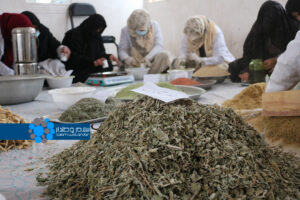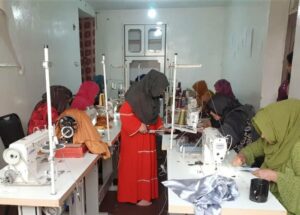KABUL (SW) – Abdul Latif Nazari, Deputy Minister for Technical Affairs at the Ministry of Economy of the Islamic Emirate, called for the removal of sanctions and restrictions on Afghanistan.
The ministry shared a post on its official X account, mentioning that Nazari made this statement on Wednesday, January 15, during a conference in Kabul, where the outcomes and implications of the 29th United Nations Climate Change Conference (COP29) were discussed.
Nazari emphasized that “sanctions and restrictions should be lifted” so that the Afghan people can effectively address the challenges of climate change through comprehensive engagement with international institutions and the global community.
“This is the right of the Afghan people,” he said.
Mr. Nazari considers that cooperating with Afghanistan in the fight against climate change issues is the responsibility of other countries, stressing that environmental and economic issues should be separated from political matters. “One of the impacts of climate change is food insecurity, while health problems are another factor. Forced migration is the final consequence, and we are facing internal displacement. This challenge requires both national and international cooperation,” he added.
The 29th United Nations Climate Change Conference, which began on November 11, 2024, in Baku, Azerbaijan, concluded after two weeks of discussions.
Participating countries at the conference agreed to increase their financial contributions to $300 billion annually by 2035, in an effort to assist developing nations in combating climate change.
Officials from the National Environmental Protection Agency (NEPA) also emphasized that climate change is a global phenomenon that requires collective efforts. Moti al-Haq Khalis, the acting head of NEPA, called on the international community to assist Afghanistan in reducing the impacts of climate change.
He said: “Afghanistan is considered one of the most affected countries. What can we do? We ask scientists to present their solutions in this conference so that we can be fully prepared for the next COP meeting.”
Meanwhile, officials from the Ministry of Foreign Affairs of the Islamic Emirate also emphasized that the world not to politicize environmental issues. Sher Mohammad Abbas Stanekzai, Deputy Minister for Political Affairs at the ministry, said, “Afghanistan must be invited to the next COP meeting so that its issues can be raised. Afghanistan faces many problems, such as irregular rainfall—when rain should fall, it doesn’t, and when crops are ripening, it rains, which is one of the climate change problems affecting the country.”
During the conference, officials highlighted food insecurity, forced migration, and drought as major consequences of climate change. Baz Mohammad Faizan, Deputy Minister for Irrigation and Natural Resources at the Ministry of Agriculture, said, “Afghanistan is an agricultural country. If rain and snow don’t fall on time and water resources decrease, it is natural that farmers will suffer.”
Additionally, Roza Otunbayeva, the head of the United Nations Assistance Mission in Afghanistan (UNAMA) emphasized that climate change in Afghanistan is a priority for UN. She, said that the mission is working to ensure that a representative of the Islamic Emirate is included in international climate change discussions.
“Afghanistan is one of the countries most affected by climate change, particularly impacting women and children. We call on international organizations to fulfill their responsibilities. Climate change in Afghanistan is a priority for the United Nations, and we are working to amplify the voice of NEPA globally and ensure its representation in international forums,” Otunbayeva stressed.
According to data from NEPA, 181 kilometers of glaciers in Afghanistan have melted in recent years due to climate change, 149 species of animals and plants are at risk of extinction, and 2.5 million people have been displaced.






